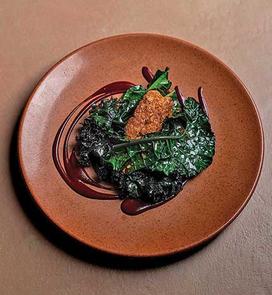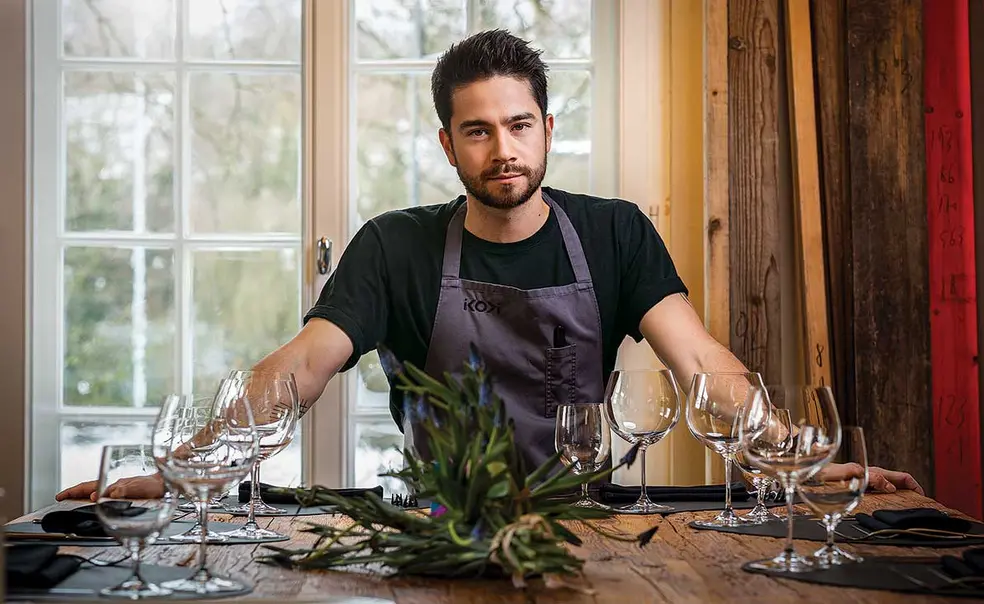Chef Jeremy Chan ’10 Creates Cuisine Like Poetry
In just four years, a fledgling London chef has secured a Michelin star and a stellar reputation
On a Tuesday afternoon last July, executive chef Jeremy Chan ’10 was chopping honeymoon melons from Mantua, Italy, in the small kitchen of Ikoyi, his London restaurant. The melons were to be soaked in a sweetened peppercorn tea infused with chamomile. After marinating for 24 hours, the fragrant, spicy slices of chilled melon would be garnished with a frozen oil infusion of elderflower, which was picked in Kent and Cheshire, England, during the COVID-19 lockdown.
Ikoyi was co-founded in 2017 by Chan and his childhood friend Iré Hassan-Odukale, and had recently reopened after restrictions were lifted. Although the restaurant is named after the Lagos neighborhood where Hassan-Odukale grew up, Ikoyi does not re-create traditional West African cuisine, which would, in Chan’s view, be culturally appropriative. Instead, Chan says, Ikoyi is a British restaurant that challenges the notion of Britishness.
Ikoyi finds its spices, such as peppercorns, on multiple continents, while drawing on homegrown produce — harvested at its peak — that showcases the capabilities of Britain’s cutting-edge farming: Habanada chillies, yuzu, koginut squash. Chan has cultivated relationships with his suppliers and deeply understands his ingredients as a result. His knowledge of cattle is almost zoological: “You can’t put a Charolais cow, which is massive, on a very rough terrain,” he explains. In October 2018, Ikoyi was awarded a Michelin star.
Chan was born in the north of England to a Chinese father and a Canadian mother and was raised between Hong Kong and the United Kingdom. He grew up associating the burning sensations that spicy food elicits with deliciousness. Spices are central to Chan’s approach at Ikoyi, connecting people with something beyond their own borders. They may inflict pain on inexperienced palates, but those who push through the initial discomfort experience the most pleasurable meal.

Chan’s interest in cooking started when he was 15; soon he had taken over responsibility for family dinners. Following graduation from Princeton, where he majored in comparative literature, he spent two years in Madrid and London working in finance, but it did not suit his personality. Cooking allowed him to channel his frustrations into something creative. He pored over cookbooks and experimented in the kitchen. One evening, he picked up his BlackBerry and quit his job over email.
Chan never attended culinary school, but he wrote to chefs he hoped to shadow and secured an apprenticeship at Claude Bosi’s London restaurant, Hibiscus. Entering a professional kitchen, he realized that he couldn’t move his hands as fast as everyone else, that others possessed knowledge he had yet to acquire. A degree from Princeton may not have prepared him for the practicalities of being a chef, but Chan’s academic training informs his food philosophy. He believes that his cuisine is a kind of gastronomical comparative literature, “taking archetypal ideas and paradigms, and mixing them and matching them like languages and styles of poetry.”
Chan’s kitchen is meticulously organized. The shelves are labeled, recipes typed and filed. As he spoke to PAW, he retrieved a binder from a high shelf, and carefully leafed through its laminated pages, pointing out recipes for crab butter, kebab mince, pastries. (A fried chicken recipe is two pages long.) He was offering a new offal hot sauce containing lacto-fermented scotch bonnets that evening. He doesn’t try new recipes after writing them, which he acknowledges is unconventional. Instead, he relies on his intuition, an understanding of flavors, and the natural balance of fats, liquids, dairy, and protein. Behind him, everyone worked quietly, swiftly chopping and washing. At this rate, they would be done with their preparations for the evening by 2 p.m., well in advance of the arrival of their guests.
A typical workday begins at 6 a.m. and lasts 18 hours. In the mornings, from home, Chan talks to butchers, scallop divers, and his sous-chefs, coordinating deliveries and placing orders. Then he cycles 5 miles to Ikoyi, where preparations for lunch and dinner service begin — butchering, baking, wine-tasting. Chan loves the “brutality of the job,” and says that the physical and mental intensity involved is more fulfilling than anything he has ever done.
During the spring lockdown last year, Chan applied for a government tax-relief grant and reduced capacity from 32 to 25. When the restaurant reopened in July, Ikoyi was fully booked. Diners were served an à la carte menu inspired by Americana comfort cuisine, blending “slightly perverse American-style junk-food elements” with hyper-luxurious, seasonal produce. Since the imposition of another national lockdown in December, he has been writing a book of recipes and essays, and conducting research in anticipation of a new menu for Ikoyi’s reopening in May. A recent invention is a candy of Alphonso mangoes flavored with ehuru (a Nigerian spice) and designed to look like a frosted egg yolk.
Chan’s experience during the pandemic has made him appreciate having a small business, and strengthened his desire to elevate the quality of Ikoyi’s food. “We’re four years on, but I’m really just beginning,” he says.












No responses yet